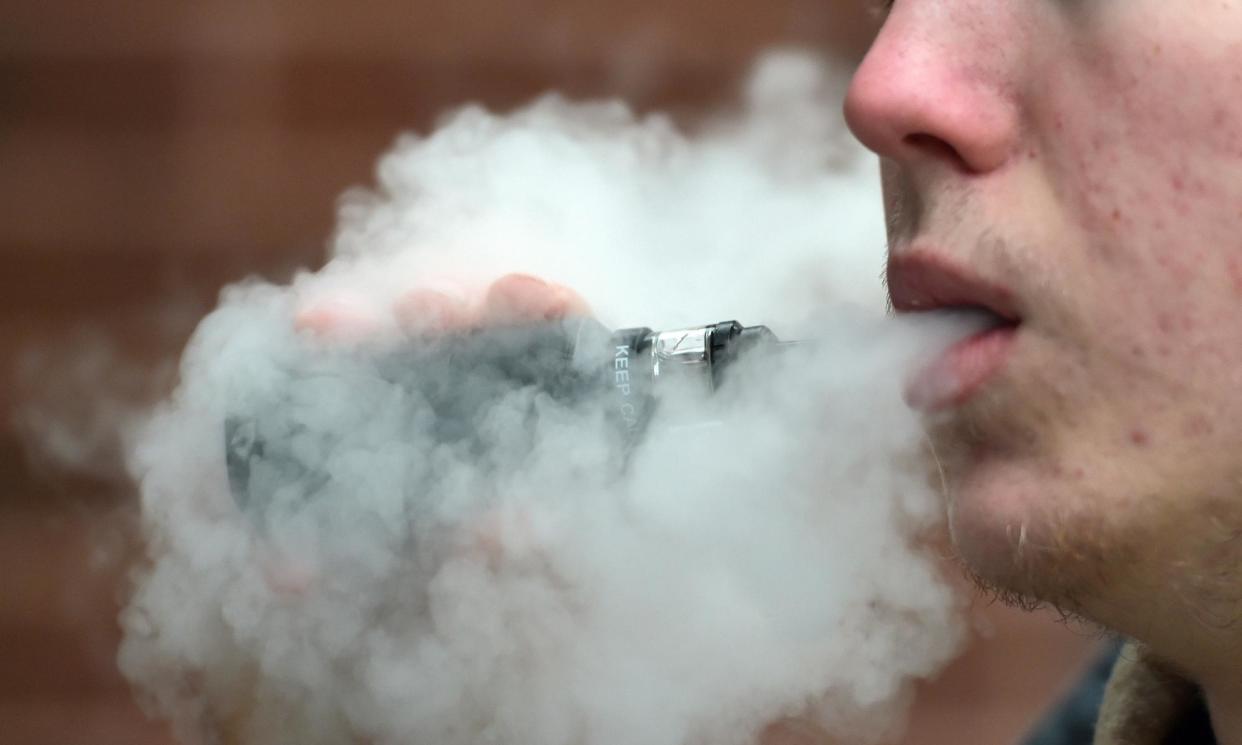Vapes should be sold behind the counter like cigarettes, says BMA

Vapes should only be sold from “behind the counter”, like cigarettes, and not be on display in shops, according to the British Medical Association.
In a report published on Wednesday, the doctors’ union called on ministers to introduce legislation to tackle the “growing epidemic” of vaping in the UK.
According to recent analysis by Action on Smoking and Health (Ash) 5.6 million adults in Britain vape, about 11% of the adult population. Vape use among children and young people has increased almost six-fold in the last decade, with 7.6% of 11-17 year olds now vaping, either regularly or occasionally, compared with 1.3% in 2014.
Vapes can help some people stop smoking, but they are not risk-free. Last year, the World Health Organization called for “urgent action” to protect children from e-cigarettes. Vaping can lead to nicotine addiction, while some devices have been found to contain other harmful substances, such as lead, or even spiked with the synthetic drug spice.
Labour announced in July’s king’s speech that it would revive the previous government’s tobacco and vapes bill. The Conservative’s proposed legislation included measures to ban disposable vapes and restrict flavours and packaging, but was shelved after the general election was called. Details of the exact regulations Labour wants to introduce have yet to be published.
The BMA said given the rising number of children and young people trying and smoking vapes, the government “must not shy away from taking brave action”.
Prof David Strain, chair of the BMA’s board of science, said: “As a doctor, I understand the role vapes can play in helping people to stop smoking, but they have no rightful place in our children and young people’s lives and when it comes to protecting their health, we cannot afford to gamble.
“An industry so obviously targeting children with colours, flavours and branding, to push a product that can lead to nicotine addiction and potential further harms cannot be allowed to happen any longer.”
The report is the first comprehensive paper laying out BMA’s policy on vaping since 2017 and is the first time it has explicitly called for restrictions on all forms of advertising and marketing of e-cigarettes.
It follows a 2023 conference resolution for the BMA to review the dangers of vaping. Wednesday’s report, titled Taking our breath away: why we need stronger regulation of vapes, calls on the government to legislate to ensure that vapes are kept behind the counter and not on display in shops and retail outlets.
“More must be done to restrict advertising of [vapes] and reduce their visibility, so children and young people are not encouraged to use them,” the report states. “Removing the visibility of vapes in shops will help to reduce exposure and awareness of the product, and in turn, their use.”
It also recommends a ban on the sale of disposable vapes and the use of any non-tobacco vape flavours. Vapes should only be sold in plain packaging, with any imagery, colouring and branding for both the packaging and vape device prohibited, as is the case for cigarettes.
Responding to the report, Deborah Arnott, chief executive of Ash, said: “In order for tougher regulations to curb youth vaping to be put in place, the tobacco and vapes bill must be fast tracked on to the statute book.
“We support strict regulation of the display and promotion of vapes and prohibiting use of sweet names, bright colours and cartoon imagery. However, vapes are a highly effective quitting aid for smokers, and it is important that they continue to be so.”
Ash supports banning flavour descriptors rather than the flavours themselves, Arnott added, as “some flavours are associated with greater success in quitting than tobacco flavour”.
Prof Lion Shahab, professor of health psychology and co-director of University College London’s tobacco and alcohol research group, said: “We have to make vaping boring again, but we must be mindful that we do not throw the baby out with the bath water.
“Proposed recommendations to curb youth use of vapes should focus on those evidence-based measures that do not also discourage harm reduction by smokers who struggle to quit that most dangerous of products: combustible cigarettes.”
A Department of Health and Social Care spokesperson said: “The marketing of vapes to children and young people is utterly unacceptable. Vapes can be an effective way for adult smokers to quit, but we have always been clear that children and adult non-smokers should never vape.
“The tobacco and vapes bill will stop vapes from deliberately being branded and advertised to appeal to children, including by regulating flavours, packaging, and changing how and where they are displayed in shops.”
John Dunne, director general of vaping trade body, the UKVIA, said: “Stronger measures are needed to cut off the supply of youth vaping and illicit products, but the proposals in this report would supercharge the black market, deter adult smokers from making the switch and drive current vapers into the hands of underground sellers or back to cigarettes.
“What’s needed to stop underage and illicit vape sales is a licensing scheme to prevent inappropriate businesses selling e-cigarettes, and stronger penalties for those caught flouting the law.”


